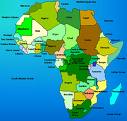Barack Obama’s New War in Central Africa?

-[A]ll previous and present U.S. military operations abroad have shown that the issue of “human rights” and similar slogans are raised selectively, whenever there is a need for the U.S. to establish its presence in this or that part of the world. This was the case with Afghanistan and Iraq; this is the case with Libya and the prospective cases of Syria and Iran.
-Three years ago, [Obama] was elected bearing the image of a dove of peace and promising to end the two wars – in Afghanistan and Iraq. None of the two is over, a third one in Libya is going on at full scale and two others – in Syria and Iran – are looming. Now, why Uganda?
Oil is the primary reason, but not the only one.
-It is worth reminding that the Vietnam War also started from sending advisors. What it ended in is too is too well known. If Barack Obama wishes to be remembered as the President who launched the biggest number of wars in American history, he has all the right to proceed with widening military presence in Uganda and elsewhere.
U.S. President Barack Obama’s last Friday’s decision to send 100 American troops to Uganda has sent waves over the political space both in the U.S. and abroad. The move seems to be quite justifiable since the primary adversary of American military “advisors” will be the so-called Lord’s Resistance Army (LRA), which has been operating in Uganda and several neighboring countries for over 20 years and is known for mass murders, rapes, abductions, arsons and other crimes.
What does not allow one to acknowledge that the U.S. military mission is a purely humanitarian character aimed at protecting the civilian population, is a series of facts related to the whole story. First, the LRA today is at its weakest point in the last 15 years. The Ugandan army has been launching relatively successful operations against the guerillas and now they are smaller in numbers than 10 years ago, scattered and based mostly in the Central African Republic and South Sudan rather than in Uganda itself.
Second, all previous and present U.S. military operations abroad have shown that the issue of “human rights” and similar slogans are raised selectively, whenever there is a need for the U.S. to establish its presence in this or that part of the world. This was the case with Afghanistan and Iraq; this is the case with Libya and the prospective cases of Syria and Iran. The main thing based in the core of all these current or prospective military actions is oil. And whatever the U.S. diplomats in Uganda might say trying to deny the obvious U.S. commercial interest does not sound true.
This fact is not only dawning upon outside observers, but even on such U.S. mainstream politicians as, for example, Senator John McCain. Appearing on CNN’s “State of the Union” on Sunday, he warned the administration to be careful and to remember the failed missions of the kind in Somalia or Lebanon.
“I worry about, with the best of intentions, that we somehow get engaged in a commitment that we can’t get out of,” said Senator McCain.
In fact, “a commitment the U.S. can’t get out of” is probably the least desired thing for President Obama. Three years ago, he was elected bearing the image of a dove of peace and promising to end the two wars – in Afghanistan and Iraq. None of the two is over, a third one in Libya is going on at full scale and two others – in Syria and Iran – are looming. Now, why Uganda?
Oil is the primary reason, but not the only one. For a decade or more, Africa has been largely neglected by the U.S. foreign policy. Being preoccupied with the “Greater Middle East”, successive administrations did not have the time, resources, power and intention to handle the problems of the “Dark Continent”. To fill the vacuum, China and lately India were only eager to replace the U.S. as the main partner of Africa. And instead of their American counterparts and competitors, the method used by the two emerging powers was that of “soft power” rather than blunt military pressure.
Such a policy has yielded its results and now Obama is frantically trying to reverse the tendency. But sending 100 troops is hardly an adequate answer to billions of dollars worth of Chinese and Indian investments.
More so, one has to agree with Senator McCain that such an engagement will be difficult to get out of. He said he remembers Somalia and Lebanon, but the Vietnam War veteran might as well remember more distant times.
It is worth reminding that the Vietnam War also started from sending advisors. What it ended in is too is too well known. If Barack Obama wishes to be remembered as the President who launched the biggest number of wars in American history, he has all the right to proceed with widening military presence in Uganda and elsewhere. But it is highly doubtful that this is really his intention. Rather, the force of inertia of the whole machine forces him into reckless adventure like the one in Uganda.
Stop NATO e-mail list home page with archives and search engine:
http://groups.yahoo.com/group/stopnato/messages
Stop NATO website and articles:
http://rickrozoff.wordpress.com

